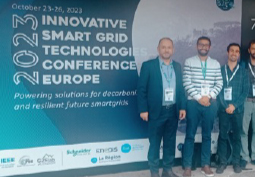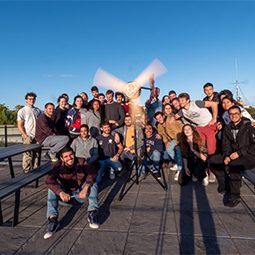| Mots-clés | iIntelligence artificielle, Data science, Digitalisation de l'énergie, Prévision pour l'énergie, Optimisation, Prescriptive analytics Artificial intelligence, data science, Energy digitalisation, Energy forecasting, Optimisation, Prescriptive analytics |
| Résumé | ... Context and challenges:
Operational management of energy systems in time scales of a few minutes to days ahead involves decision making that results from two major steps: (1) leveraging contextual information to forecast uncertain input quantities like electricity demand, weather-dependent renewable production (wind, solar, hydroâ¦), electricity market quantities (prices, imbalancesâ¦), and (2) optimization, where the forecasts are used as input to optimization tools for congestion management, economic dispatch, unit commitment, electricity trading, reserves estimation and other applications. The classical âForecast then Optimiseâ approach may involve a complex model chain of multiple models that one has to tune and maintain. For example, when trading the production of a virtual power plant (VPP) in day ahead and ancillary service markets, one may need as many as 11 models (energy and market quantities forecasting and stochastic optimization). Further, forecast accuracy might not align with performance optimality. In the last years the new paradigm of âPrescriptive Analyticsâ emerged, where data-driven approaches integrated the two steps. For example, end-to-end machine learning (ML) models can be trained to minimize the downstream decisions regret or even directly learn a mapping from data to decisions. First works that focus on the energy trading model chain have shown that equivalent results can be obtained with the analytical approach. This is a new and very promising field that needs to be further explored in different use cases and contexts.
Main objective of the thesis:
The overarching objective of this thesis is to develop and validate the prescriptive analytics approach in different use cases of the energy sector. The aim is to develop methods based on data-driven optimization and ML that improve decision quality and simplify complex model chains. The considered use cases can be the classical ones of predictive management of power systems but also applications that can be related to edge computing or even industrial processes. The application of prescriptive analytics at the âedgeâ, and especially at the consumers level (EVs, smart homes, smart buildingsâ¦), is promising since it permits to simplify the model chain at that level and thus to robustify and automatize the âintelligenceâ layer of applications at that level. In this context, it is also important to consider aspects such as the intepretability of decisions given the context, as well as to ensure that the algorithmic design permits implementation in micro-computers.
Methodology and expected results:
The methodological focus is on the edge of machine learning and mathematical programming. The first step will be to carry out a bibliographic research and familiarize with previous developments in this area in our Centre. These developments concern existing probabilistic forecasting methods for energy forecasting (demand, EVs demand, prices, renewable generation), as well as optimization algorithms for trading of VPPs, optimal power flow, congestion management, microgrids scheduling and other applications. PERSEE has developed first approaches for prescriptive analytics based on artificial neural networks and prescriptive decision trees focusing on the energy trading application. The aim is to propose generic solutions for a broad number of typical use cases and deal with requirements for adaptability/replicability, interpretability, feasibility of decisions, as well as privacy/confidentiality preservation when information/data is shared, automatization of the process, resilience on disruptive events, etc. An experimental implementation for such a typical use-case (i.e. energy community with smart homes or microgrid management) may be envisaged to demonstrate AI-based prescriptive solutions on the edge. |
| Profil candidat | .... Profile:
Engineer and / or Master of Science degree (candidates may apply prior to obtaining their master's degree. The PhD will start though after the degree is succesfully obtained).
Good level of general and scientific culture. Good analytical, synthesis, innovation and communication skills. Qualities of adaptability and creativity. Motivation for research activity. Coherent professional project. Skills in programming (eg,Python, R, Julia,â¦) and knowledge of optimization tools (e.g, Gurobi, CPLEX).
A succesful candidate will have a solid background in two or more of the following competencies:
⢠data science, artificial intelligence
⢠applied mathematics, statistics and probabilities
⢠optimisation
⢠energy forecasting
⢠power system management, integration of renewables
Expected level in french : Good level
Expected level in english : Proficiency
TO apply:
Please send the following elements by email to Prof. George Kariniotakis (georges.kariniotakis@minesparis.psl.eu) AND to Dr. Simon Camal (simon.camal@minesparis.psl.eu)
⢠Curriculum vitae (CV).
⢠Motivational letter for the application (cover letter).
⢠Contact details of two individuals that can provide a letter of reference (and eventually available already letters of reference).
⢠Copy of grade transcripts and last diploma (in English or French).
Please use in the title of email the acronym of this PhD topic âPHD-2024-ERSEI-Prescriptiveâ
Deadline for applications: 29/02/2024 (however, the position will remain open until a suitable candidate is found).
You can email to the above addresses for further information on the position. |










